art-e-conomy _ reader - marko stamenkovic
art-e-conomy _ reader - marko stamenkovic
art-e-conomy _ reader - marko stamenkovic
You also want an ePaper? Increase the reach of your titles
YUMPU automatically turns print PDFs into web optimized ePapers that Google loves.
88<br />
of-life that changes through what might be called a non-sovereign decision, at once<br />
distributed and diffuse, or, if you like, an exception-from-below. This is why phrases<br />
such as “innovation culture” or indeed “creative industries” ring of an oxymoronic<br />
disingenuousness that wants to suggest that innovation can coexist with or become<br />
subordinated to the status quo. In this context, innovation becomes nothing other<br />
than a code word for more of the same – the reduction of creativity to the formal<br />
indifference of the market.<br />
At the same time, Virno recognises that this reduction is precisely what contemporary<br />
capitalist production mandates. If, for Butler, human relation is possessed by a<br />
precariousness that furnishes a complex sense of political community, Virno argues<br />
that this same instability comes to invest the labour relation that, under post-Fordist<br />
capitalism, demands creative linguistic innovation. At stake for him is an affirmation<br />
of Marx’s notion of general intellect. Common to the disparate situations and<br />
conditions of individuals and their social horizons is a shared capacity to draw on<br />
the resources at hand. And this is why Virno and other post-operaista thinkers have<br />
advocated exodus as opposed to revolution as a political tactic. Such an advocacy of<br />
escape or “engaged withdrawal” does not imply a hermetic retreat from modernity.<br />
Rather, it involves both the recognition that capitalism removes the means for living<br />
other than by recourse to wage labour and the imperative to search for strategies<br />
and opportunities that allow collective intellect to subtract its creativity from the<br />
integuments of productive labour. What interests us is the form that such an exodus<br />
might assume within contemporary socio-technical formations characterised by a<br />
proliferation of networks alongside a host of institutions that are becoming increasingly<br />
burdened and recondite.<br />
Whatever the current possibilities for desertion or exodus, it is hard to escape the<br />
observation that the corporate-state nexus increasingly asserts a sovereign command<br />
over the very matter of our bodies. With the informatisation of social and economic<br />
relations, intellectual property is the regime of scarcity through which control is exerted<br />
over the substance of life. Think of the rush to patent recombinant DNA sequences<br />
or the pressure placed upon agricultural industries and government representatives<br />
to adopt genetically modified organisms. Despite the dot.com crash of 2000, stocks<br />
in biotech industries are again yielding substantial profits – a phenomenon fueled in<br />
p<strong>art</strong> by aging populations anxious to invest in narratives of security and technologies<br />
of arrested decay. This revival of biotech stocks can also be seen as a response to<br />
the affective e<strong>conomy</strong> associated with the shift of venture capital into the business<br />
of bio-terrorism and a move from what Melinda Cooper (2004) calls the irrational<br />
exuberance of nineties speculative capital into an era of indefinite insecurity and<br />
permanent catastrophe within a post-9/11 environment.<br />
Yet where resides the space of commons exterior to both the state and the<br />
interests of the market? Indeed, is it even possible to invoke this sense of exteriority<br />
within an ontological and social-technical field of immanence and political e<strong>conomy</strong><br />
in which capital interpenetrates the matter of life? It is no longer feasible to draw a<br />
homology between the commons and the notion of the public – a social body too<br />
easily assumed as co-extensive with the citizen-subject. Both the citizen-subject and<br />
the public are categories that refer p<strong>art</strong>icularly to European and North American


